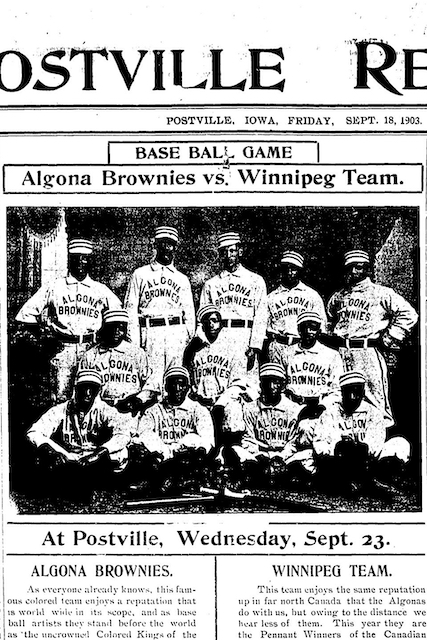
The 1903 Algona Brownies pictured in the Sept. 18, 1903, issue of the Postville Review previews their game to be played against the Winnipeg Maroons in Postville on Sept. 23. Photo courtesy of newspaperarchive.com
May/June 2024 (Volume 16, Issue 3)
By David A. Jepsen
Stories of successful baseball teams and players can be found throughout Iowa but few are like that of the 1903 baseball team that laid claim to the title “Colored Champions of the West” — the Algona Brownies.
The history behind this claim offers intrigue on and off the field. Algona’s population in 1900 was 2,911 and Kossuth County’s population was 22,720, which included only eight Black residents. Some of it was captured by David Kemp and Roger Wilden in a 1981 article for The Baseball Research Journal, which was the subject of Maury White’s story in The Des Moines Register on Aug. 28, 1994. But there is more to the story of the Algona Brownies and its championship 1903 season.
For starters, “The West” had a different meaning in 1903 than it does today, referring to states west of the Mississippi River. Oklahoma, Arizona and New Mexico were territories, not yet states. Baseball was different, too. There were no Major League Baseball teams in “The West.” In fact, no World Series champion was crowned until October of 1903 when the Boston Americans defeated the Pittsburgh Pirates in a best-of-nine series, five games to three.
What circumstances allowed the 1903 community of Algona to support such a talented baseball team that dramatically improved upon its 1902 season? Perhaps the most important was the presence of community leaders selected to head the Algona Base Ball Association. Most prominent were two partners in banking and local real estate, E.J. Murtagh and Gardner Cowles, Sr. Murtagh, a Waverly native, was president of several regional banks and a delegate to the 1900 National Democratic Convention. Entries in his personal diary provide a sequence of events for the 1903 season. Cowles was also a newspaperman and from 1899 to 1903 was elected Republican assemblyman. A year later, Cowles purchased The Des Moines Register.
The Algona Base Ball Association raised more than $1,500 in stock sales and allocated $1,050 for player salaries as a first step towards developing a competitive baseball team. On May 4, 1903, according to Murtagh’s diary, another Algona businessman, hotel owner H.J. Tremain, boarded a Chicago Northwestern train bound for Chicago, Ill., in search of baseball talent. A week later he returned to Algona having signed contracts with nine “colored” players. Players reported for the first practice on May 10th and on May 13th they were joined by four additional “colored” players. Consequently, the 1903 Algona Brownies roster consisted of 11 former Chicago Unions or Columbia Giants players plus two other Black players, including pitcher Billy Holland from a team based in Waseca, Minn. All Brownies players were housed at the Peck Hotel in Algona.
TO READ THE ENTIRE STORY AND OTHER FASCINATING STORIES ABOUT IOWA HISTORY, subscribe to Iowa History Journal.
